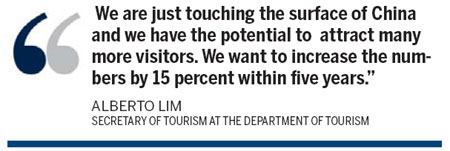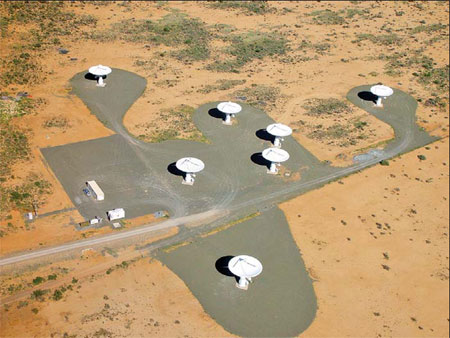Building the case for South Africa
Updated: 2011-09-15 07:45
(China Daily)
|
|||||||||||
|
Karoo Array Telescope (KAT - 7) is already operational in the Northern Cape Province, South Africa. |

Winning the bid would present opportunities for global R&D and future investment
Staring at the stars could be one of South Africa's smartest investments, if the country's bid to host the world's largest radio telescope, the Square Kilometer Array (SKA), is successful.
Securing the SKA for South Africa would provide not only a significant financial investment from international organizations, but it would significantly increase South Africa's research and development skills and boost the scientific capacity of universities all over the continent.
The potential impact of the project is already being compared to the World Cup, and with good reason.
Just like the FIFA 2010 Soccer World Cup, the Square Kilometer Array (SKA) will place South Africa firmly on the world stage and leave a lasting infrastructural legacy which will benefit both the world's scientific and research communities, as well as the people of South Africa and the African continent through economic growth and education and skills development.
According to Miller Matola, CEO of the International Marketing Council of South Africa (IMC), custodians of Brand South Africa, "knowledge is the most important commodity in the modern economy. The SKA project will help foster talent and skills not only here in South Africa, but across the globe as well. Growing South Africa's scientific capacity is a government priority, and while the country is growing as an industrialized economy the SKA will spur investment and accelerate talent development."
Once built, the SKA will be the world's largest radio telescope, and will be between 50 and 100 times more sensitive and 10,000 times faster than any existing radio imaging telescope.
Radio telescopes enable astronomers to listen to electromagnetic radiation, which travels at a fixed speed of about 1.08 billion km/h.
The SKA will enable astronomers to observe objects in the outer edges of the universe, and help researchers better understand the universe's origins. At present, these tools are not available, so the SKA will have a considerable impact on world scientific knowledge.
Both South Africa - supported by eight other African countries - and Australia (allied with New Zealand) are bidding for the right to host the SKA project, having already beaten Argentina and Chile.
The final decision will be made in 2012 by those countries funding the project, but both contenders are lobbying hard as the capital investment is estimated to be worth 1.5 billion euro ($2.18 billion).
To cover the operating costs, a further 100-150 million euro will be spent every year, of which a significant portion would be spent in the host country. Construction is planned to start in 2016 and finish by 2022.
Location is key, as the SKA requires an area of at least 100 km surrounding the project which is free from radio interference.
In addition, the 3,000-km surrounding the project needs to be silent from all interference, including radio signals.
South Africa is able to offer at least 150 km of land free from interference in an area near Carnavon in the Karoo. With its partners, South Africa would have substantial research capacity.
Outlying stations will be located in Botswana, Mozambique, Namibia, Zambia, Kenya and Ghana. Madagascar and Mauritius are also supporting South Africa's bid and the African Union has acknowledged the importance of the bid for capacity building across the continent. "This is truly an African bid and project," says Matola.
South Africa is already reaping the benefits of the SKA through a comprehensive skills development program to support students in physics, astronomy, engineering and ICT.
To date, 263 academic grants have been awarded since 2005. In addition, the University of Botswana, Madagascar's University of Antanarivo, and Mozambique's Eduardo Mondlane University have introduced courses in astronomy and astrophysics.
Minister of Science and Technology Naledi Pandor said the SKA will provide practical work opportunities for these students and will enhance the uptake of science training programs.
Bilateral agreements have been established with some of the key institutions in the SKA consortium, including the universities of Oxford and Cambridge, the University of California at Berkeley and Caltech, the National Radio Astronomy Observatory of the US, the National Radio Astronomy Center in India and three radio astronomy institutes in Italy.
Last year, South Africa beat 20 other countries in its bid to host the International Astronomical Union Office, which, among other objectives, promotes astronomical research and education in developing countries.
This development signals the prestige South Africa has already gained in astronomy. If South Africa is chosen to host the SKA, the facility will pave the way for Africa to contribute significantly to the global technology economy.
The Karoo, a vast desert area in western South Africa, is already a favoured location for astronomy, and the Karoo Array Telescope (MeerKAT), a powerful 80-dish radio telescope in its own right, is being built as part of South Africa's bid.
MeerKAT will be commissioned in 2014 at the earliest but is already in demand, with more than 43,000 hours of radio observation time already allocated. MeerKAT's precursor, a seven-dish demonstrator project known as KAT-7 is already operational.
In a further boost to South Africa's bid, a 10.4-million-euro ultra-high-speed broadband link now connects the Southern African Large Telescope (SALT) - the largest single optical telescope in the southern hemisphere, in Sutherland - and the MeerKAT site with the South Africa National Research Network in Cape Town.
The 10 gigabyte fiber-optic link demonstrates that South Africa can provide the bandwidth SKA would require, and gives researchers real-time access to the data collected by SALT and MeerKAT. SALT, MeerKAT and similar projects demonstrate that South Africa already has the capacity to successfully host the SKA.
(China Daily 09/15/2011 page6)
